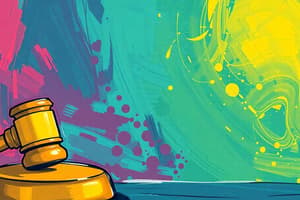Podcast
Questions and Answers
What is one key factor that differentiates an independent contractor from an employee?
What is one key factor that differentiates an independent contractor from an employee?
- Degree of supervision & control over worker (correct)
- Type of work performed
- Level of education required
- Amount of income generated
Which of the following does NOT represent a duty of employees?
Which of the following does NOT represent a duty of employees?
- Duty to find new clients (correct)
- Duty to obey
- Duty to exercise skill and care
- Duty of good faith and fidelity
What is vicarious liability in the context of employment?
What is vicarious liability in the context of employment?
- An employer's liability for actions of an employee (correct)
- An employer's responsibility for their own actions
- An employer's liability for actions of a non-employee
- An employee's liability for actions of a customer
What is typically included in the calculation of payment in lieu of notice?
What is typically included in the calculation of payment in lieu of notice?
What determines whether a contract is frustrated if the contract is governed by the Sale of Goods Act and the goods are destroyed?
What determines whether a contract is frustrated if the contract is governed by the Sale of Goods Act and the goods are destroyed?
Which factor is NOT relevant when determining a reasonable notice period for termination of an employee?
Which factor is NOT relevant when determining a reasonable notice period for termination of an employee?
What is the implication of a breach of condition in a contract?
What is the implication of a breach of condition in a contract?
Which of the following is true regarding a breach of warranty?
Which of the following is true regarding a breach of warranty?
Which statement accurately describes a major breach of contract?
Which statement accurately describes a major breach of contract?
If a party wishes to discharge a contract due to a condition breach, what must they demonstrate?
If a party wishes to discharge a contract due to a condition breach, what must they demonstrate?
Which act applies when determining allocation of losses in frustrated contracts in provinces that have such legislation?
Which act applies when determining allocation of losses in frustrated contracts in provinces that have such legislation?
Under what circumstance is a contract automatically discharged due to bankruptcy?
Under what circumstance is a contract automatically discharged due to bankruptcy?
What does the limitation period refer to under the Limitations Act?
What does the limitation period refer to under the Limitations Act?
What is the primary duty of an agent to their principal?
What is the primary duty of an agent to their principal?
What does the duty of care entail for an agent?
What does the duty of care entail for an agent?
What constitutes the process of ratification in an agency context?
What constitutes the process of ratification in an agency context?
What is one of the agent's responsibilities when acting for two principals?
What is one of the agent's responsibilities when acting for two principals?
Under what circumstances must a principal pay for an agent's expenses?
Under what circumstances must a principal pay for an agent's expenses?
What is a principal's duty regarding remuneration to an agent?
What is a principal's duty regarding remuneration to an agent?
What must an agent do before acting as a contracting party?
What must an agent do before acting as a contracting party?
When is a principal solely liable for actions taken by an agent?
When is a principal solely liable for actions taken by an agent?
What best describes unconscionable clauses in a contract?
What best describes unconscionable clauses in a contract?
What is the primary purpose of awarding damages in contract law?
What is the primary purpose of awarding damages in contract law?
Which type of damages focuses on lost profits due to breach at contract formation?
Which type of damages focuses on lost profits due to breach at contract formation?
What is required for a court to consider an injunction?
What is required for a court to consider an injunction?
Which type of damages accounts for wasted effort due to reliance on a contract?
Which type of damages accounts for wasted effort due to reliance on a contract?
Under what condition might special circumstances affect the liability of a breaching party?
Under what condition might special circumstances affect the liability of a breaching party?
Which type of damages is typically awarded when loss is minimal or negligible?
Which type of damages is typically awarded when loss is minimal or negligible?
What is quantum meruit meant to determine?
What is quantum meruit meant to determine?
Which category of remedies involves court orders beyond monetary compensation?
Which category of remedies involves court orders beyond monetary compensation?
What do consequential damages cover in a breach of contract situation?
What do consequential damages cover in a breach of contract situation?
What is the primary factor that determines priority in a registered security interest under the PPSA?
What is the primary factor that determines priority in a registered security interest under the PPSA?
What does the separation of possession and ownership imply for third-party purchasers?
What does the separation of possession and ownership imply for third-party purchasers?
What is a key characteristic of a partnership according to legal principles?
What is a key characteristic of a partnership according to legal principles?
Under what conditions can a partnership be automatically deemed to be created?
Under what conditions can a partnership be automatically deemed to be created?
What is the default method for the termination of a partnership?
What is the default method for the termination of a partnership?
How are partners in a partnership typically liable for the obligations of the partnership?
How are partners in a partnership typically liable for the obligations of the partnership?
What can trigger the dissolution of a partnership due to conduct?
What can trigger the dissolution of a partnership due to conduct?
What is required for a sole proprietorship to register a business name?
What is required for a sole proprietorship to register a business name?
What distinguishes a public corporation from a private company?
What distinguishes a public corporation from a private company?
Which power is NOT held by the directors of a corporation?
Which power is NOT held by the directors of a corporation?
What is required for the transfer of shares in a corporation?
What is required for the transfer of shares in a corporation?
What duty is expected of directors and officers when executing their powers?
What duty is expected of directors and officers when executing their powers?
Which of the following applies to the personal liability of a director?
Which of the following applies to the personal liability of a director?
How long can a director serve before needing re-election?
How long can a director serve before needing re-election?
What constitutes a breach of the duty of care by directors?
What constitutes a breach of the duty of care by directors?
What should directors NOT rely on when making decisions?
What should directors NOT rely on when making decisions?
What is one of the specific powers of the directors?
What is one of the specific powers of the directors?
What must happen for a director to be removed before their term ends?
What must happen for a director to be removed before their term ends?
Flashcards
Frustration of a contract
Frustration of a contract
A contract is discharged (ended) due to unforeseen circumstances beyond the control of either party, making performance impossible or radically different from what was intended.
Sale of Goods Act & Frustration
Sale of Goods Act & Frustration
If a contract deals with goods and those goods are destroyed, the rules for frustration are those of the Sale of Goods Act, otherwise common law applies.
Frustrated Contracts Act
Frustrated Contracts Act
A law used to fairly allocate losses when a contract is frustrated (Some Provinces)
Condition (contract)
Condition (contract)
Signup and view all the flashcards
Warranty (contract)
Warranty (contract)
Signup and view all the flashcards
Major Breach
Major Breach
Signup and view all the flashcards
Minor Breach
Minor Breach
Signup and view all the flashcards
Discharge by Operation of Law
Discharge by Operation of Law
Signup and view all the flashcards
Unconscionable Clauses
Unconscionable Clauses
Signup and view all the flashcards
Public Policy/Interest
Public Policy/Interest
Signup and view all the flashcards
Damages (Contract Law)
Damages (Contract Law)
Signup and view all the flashcards
Expectation Damages
Expectation Damages
Signup and view all the flashcards
Mitigation of Damages
Mitigation of Damages
Signup and view all the flashcards
Consequential Damages
Consequential Damages
Signup and view all the flashcards
Specific Performance
Specific Performance
Signup and view all the flashcards
Injunction
Injunction
Signup and view all the flashcards
Quantum Meruit
Quantum Meruit
Signup and view all the flashcards
Liquidated Damages
Liquidated Damages
Signup and view all the flashcards
Agent's Authority
Agent's Authority
Signup and view all the flashcards
Ratification
Ratification
Signup and view all the flashcards
Agent's Duty of Care
Agent's Duty of Care
Signup and view all the flashcards
Fiduciary Duty (Good Faith)
Fiduciary Duty (Good Faith)
Signup and view all the flashcards
Agent's Duty to Disclose
Agent's Duty to Disclose
Signup and view all the flashcards
Principal's Duty to Pay
Principal's Duty to Pay
Signup and view all the flashcards
Principal's Duty to Reimburse
Principal's Duty to Reimburse
Signup and view all the flashcards
Liability of Principal and Third Parties in Agency
Liability of Principal and Third Parties in Agency
Signup and view all the flashcards
Vicarious Liability
Vicarious Liability
Signup and view all the flashcards
Negligent Hiring
Negligent Hiring
Signup and view all the flashcards
Wrongful Referral
Wrongful Referral
Signup and view all the flashcards
Employee Duty of Good Faith
Employee Duty of Good Faith
Signup and view all the flashcards
Employer’s Duty to Pay
Employer’s Duty to Pay
Signup and view all the flashcards
Bailment
Bailment
Signup and view all the flashcards
Pledge
Pledge
Signup and view all the flashcards
Time of Perfection
Time of Perfection
Signup and view all the flashcards
Sole Proprietorship
Sole Proprietorship
Signup and view all the flashcards
Partnership
Partnership
Signup and view all the flashcards
Partnership Agreement
Partnership Agreement
Signup and view all the flashcards
Contractual Liability (Partnership)
Contractual Liability (Partnership)
Signup and view all the flashcards
Tort Liability (Partnership)
Tort Liability (Partnership)
Signup and view all the flashcards
Public Corporation
Public Corporation
Signup and view all the flashcards
Private Company
Private Company
Signup and view all the flashcards
Corporate Capital
Corporate Capital
Signup and view all the flashcards
Equity
Equity
Signup and view all the flashcards
Debt
Debt
Signup and view all the flashcards
Corporate Governance
Corporate Governance
Signup and view all the flashcards
Directors
Directors
Signup and view all the flashcards
Officers
Officers
Signup and view all the flashcards
Fiduciary Duty
Fiduciary Duty
Signup and view all the flashcards
Duties of Care and Skill
Duties of Care and Skill
Signup and view all the flashcards
Study Notes
Discharge of Contracts
- Discharge by Performance: Both parties fulfill their contractual obligations
- Discharge by Agreement: Parties mutually agree to end the contract
- Substituted agreement: Replace the original contract with a new one
- Accord and satisfaction: One party agrees to pay a certain amount instead of performing
- Discharge by Frustration: External events make performance radically different from what was agreed
- Requirements for Frustration:
- Unforeseen event
- Event outside parties' control
- Event occurs after agreement
- Event makes performance impossible, purposeless, or drastically different
- Self-induced frustration: One party makes performance impossible through their actions, can’t claim frustration
- Requirements for Frustration:
Effect of Breach
- Minor Breach: Breach of a non-essential term; doesn't discharge the contract
- Major Breach: Breach of essential term; can discharge the contract
- How breach occurs:
- Express repudiation: One party clearly states they won't perform
- Failure to perform or inadequate performance: Not fulfilling the contract as agreed
Remedies
- Damages: Monetary compensation for losses caused by breach
- Mitigation: Efforts to reduce losses from a breach
- Punitive damages: Intended to punish the breaching party, not just compensate
- Equitable remedies: Court orders other than monetary settlements (e.g., specific performance, injunctions)
Agency & Franchising
- Creating an Agency relationship: Two contracts
- Between the Principal and Agent
- Between Principal and Third Party
- Apparent Authority: Authority not explicitly given but implied from the relationship.
- Duties of an Agent to the Principal: Duty to comply; Duty of Care; Duty of Good Faith
- Duties of Principal to Agent: Duty to Pay; Duty to Compensate
- Rights and Liabilities of Principal and Agent to Third Parties: Under What circumstances is the principal liable? When is the agent liable? When are both liable?
- Undisclosed Principals: Principal is hidden from third party; Principal may or may not be liable.
Employment Law
- Employee vs. Independent Contractor: Differences in supervision, control, tools, method of payment and benefits.
- Tort of Employer: Vicarious Liability (employer is liable for employee torts). Negligent hiring; wrong referral
- Employee Duties: Duty to obey; Duty to exercise skill and care
- Employer's Duties: Duty to pay; Termination of Employment: Notice, Lieu, for cause.
- Wrongful Dismissal: An employee being fired for reasons not in the employment contract.
Secured Transactions
- Bailment: One party has temporary possession of property owned by another with the duty to return it.
- Secured Transactions: A loan or credit agreement where the lender takes a security interest in collateral owned by the borrower (if borrower defaults).
- Personal Property vs. Real Property; Rights of a Secured Creditor
Business Organizations
- Sole Proprietorship: Unincorporated business owned by one person. Risk: the business owner is personally liable
- Partnership: Agreement among two or more people to run a business together for profit. Risk: the partners are jointly liable for debts
Corporate Governance
- Director Roles: Oversight, setting strategy, fiduciary duties to the corporation
- Directors/Officers/Shareholders/Stakeholders: Responsibilities and Powers
- Shareholder Rights: Ordinary/special resolutions, Protection of minority shareholders
Intellectual Property
- Copyright: Rights granted to creators of original work
- Trademarks: Distinctive signs identifying goods and services
- Patents: Protection for inventions
Criminal Liability
- Corporate Identity Doctrine: Culpability for actions through the intent and action of an authorized director/officer
- When can you send an advertisement under CASL (Canada Anti-Spam Law): Consent and prior business relations
Privacy
- How can you collect/store/use personal information: Regulations based on laws and public sector/private/security requirements.
- Liability for privacy violations: Legal liability for violating privacy (intrusive, unethical behavior)
International Law
- Van Breda Test: Determines jurisdiction for disputes and tort liability
Studying That Suits You
Use AI to generate personalized quizzes and flashcards to suit your learning preferences.




